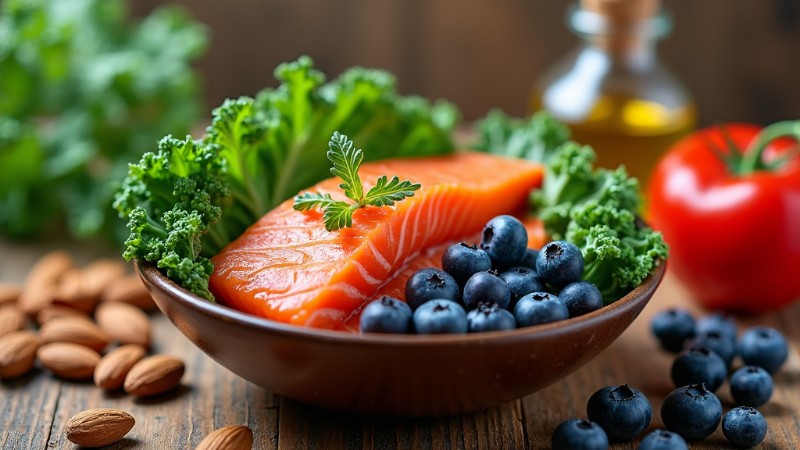Maintaining cardiovascular health requires balanced, nutritious food choices, yet the fast-food industry often undermines these efforts with its high-calorie, sodium-laden options. Major chains like Chick-fil-A, McDonald’s, and Dairy Queen have popular items rich in processed ingredients, fats, and salts that can negatively impact heart health over time.
Health professionals like registered dietitian Krutika Nanavati and Dr Erik Natkin have flagged these foods as potential contributors to conditions such as high blood pressure, cholesterol buildup, and, ultimately, heart disease. Their insights encourage consumers to make informed decisions, considering the long-term health effects of these quick, convenient meals.
Fast food’s convenience appeals to many, yet its ingredients often come with hidden health risks. This reality prompts a rethinking of dietary habits, especially for those focused on cardiovascular wellness. As the demand for accessible meal options rises, understanding these impacts can be vital to making more heart-conscious choices.
Key Takeaways
Consuming fast food regularly can harm your heart health due to its high-calorie, sodium-laden options that increase blood pressure, cholesterol buildup, and the risk of heart disease.
- Fast foods often contain high levels of sodium and saturated fats, which are associated with cardiovascular issues such as hypertension and elevated risk of heart attacks and strokes.
- Processed meats in fast food, like sausages and bacon, have been linked to higher rates of heart disease due to preservatives, salts, and nitrates that increase the risk of cardiovascular complications and cancer.
- Making healthier choices at fast-food restaurants involves opting for grilled or baked items over fried ones, being sodium smart by choosing lower-sodium options, skipping processed meat, and balancing meals with whole foods like fruits and vegetables.
Unpacking the risks of fast-food ingredients
Fast food frequently contains high levels of sodium and saturated fats, both of which are associated with cardiovascular issues. Sodium, while essential in small amounts, becomes a health risk in excess.
High sodium levels increase blood pressure, which strains the cardiovascular system. Foods such as the Chick-fil-A Chicken Sandwich, which contains over half the recommended daily sodium intake, can lead to hypertension and elevate the risk of heart attacks and strokes over time.
The type and quantity of fat in fast food also contribute to poor cardiovascular health. Saturated fats are found in many of these meals, notably in items like McDonald’s Big Breakfast with Hotcakes.
Dr. Natkin advises against high-calorie, high-fat breakfasts like these, which contain approximately 1,340 calories and nearly an ounce of saturated fat. Consuming saturated fats in such quantities can lead to higher levels of low-density lipoprotein (LDL), or “bad” cholesterol, which clogs arteries and heightens the risk of cardiovascular disease.
The processed meat problem
In addition to sodium and fat, fast foods often contain processed meats, which have been linked to higher rates of heart disease. Processed meats, like those used in sausages, bacon, and even some turkey or chicken versions, contain preservatives, salts, and nitrates.
Harvard Health researchers warn that these additives increase the risk of cardiovascular complications and cancer. Even leaner meats like turkey and chicken, when processed, do not eliminate the risks associated with preservatives and saturated fats.
The prevalence of these meats in fast-food breakfasts, burgers, and sides means that frequent consumers are often exposed to more cardiovascular risks than they realize. Processed meats not only raise cholesterol levels but may also contribute to inflammation and oxidative stress, both of which further strain heart health. Swapping out processed meats for fresh, whole foods can be one of the most effective ways to reduce these risks.
Healthier choices at fast-food restaurants
Making heart-healthy choices in fast food settings is challenging, yet achievable with some awareness and planning. Dietitian Krutika Nanavati and Dr. Natkin recommend several practical steps for navigating fast food menus with cardiovascular health in mind.
Opt for Grilled or Baked Over Fried: Choosing grilled or baked items instead of fried ones significantly reduces saturated fat intake. Chick-fil-A, for instance, offers a grilled chicken sandwich that is a healthier alternative to its fried counterpart. Likewise, selecting grilled chicken nuggets or salads with lean proteins can help reduce the intake of artery-clogging fats.
Be Sodium Smart: Menu items high in sodium can exacerbate hypertension and strain the cardiovascular system. Consumers should aim for dishes with lower sodium levels, especially when pairing items in a meal. Choosing sides like apple slices over fries, requesting sauces on the side, and opting for smaller portion sizes can help minimize sodium intake.
Skip the Processed Meat: Processed meats, whether in burgers, breakfast items, or wraps, are a significant source of unhealthy fats and sodium. Opting for vegetarian options or meals that incorporate whole proteins, like grilled chicken, can be a step towards better heart health. Many chains now offer veggie options or grilled, skinless chicken as alternatives to processed meats.
Balance with Whole Foods: While fast-food restaurants often lack fresh fruit and vegetable options, pairing meals with whole foods like a side salad or fresh fruits from home can offset some of the negative effects of fast food. Vegetables and whole grains provide fiber, which aids in managing cholesterol and blood sugar levels.
Heart-healthy habits beyond diet
Healthy choices go beyond the food itself. Senior adults, who may face higher cardiovascular risks, can benefit from incorporating a balanced diet, meal planning, and physical activity into their daily routine.
Exercising regularly—ideally at least 30 minutes of moderate activity each day—helps maintain a healthy heart. Activities such as brisk walking, swimming, or light cycling are ideal for cardiovascular health and can be adjusted for seniors’ specific needs.
In addition, home-cooked meals can often provide a healthier alternative to fast food. Preparing meals at home allows for control over sodium, fat, and the quality of ingredients.
Seniors and caregivers can prioritize ingredients like lean meats, whole grains, and fresh vegetables while avoiding processed foods and added salts. Utilizing heart-healthy oils like olive or canola oil in cooking, rather than saturated fats, can also help in reducing LDL cholesterol and promoting heart health.
Preparing heart-healthy meals at home
Choose Heart-Healthy Fats: Olive oil, avocado oil, and other unsaturated fats are better for heart health than saturated or trans fats found in butter and margarine. Substituting these oils for less healthy options in cooking can have lasting benefits for cholesterol management.
Incorporate High-Fiber Foods: Whole grains, fruits, and vegetables contain fiber, which is essential for lowering cholesterol. Adding oats, beans, lentils, and a variety of colorful fruits and vegetables to meals helps promote satiety and stabilize blood sugar levels, benefiting heart health in the long run.
Plan Balanced Meals: Building balanced meals that include lean proteins, complex carbohydrates, and healthy fats provides comprehensive nutrition while helping to manage weight, which is crucial for heart health. Recipes like grilled chicken with roasted vegetables and quinoa, or salmon with brown rice and a side salad, are nutrient-dense and easy to prepare.
Make Small Changes for Big Results: Little changes like reducing red meat consumption, using herbs and spices in place of salt, and drinking plenty of water can make a significant impact on heart health. For seniors, who may require special diets or have specific health concerns, consulting with a registered dietitian can help tailor meal plans to individual needs.
Embracing a heart-healthy lifestyle
A balanced, heart-healthy lifestyle can reduce the risk of cardiovascular disease, stroke, and high blood pressure, allowing seniors to enjoy improved overall health. By following a diet rich in whole foods, lean proteins, and healthy fats, and by limiting fast food to occasional treats, individuals can protect their cardiovascular health while still enjoying dining out.
For more insights on making heart-smart choices with fast food, review the findings of dietitians and nutritionists from trusted health sources and consider consulting a healthcare provider for personalized dietary advice.















